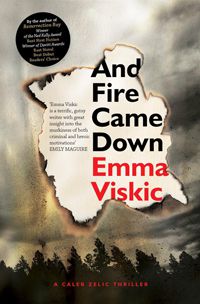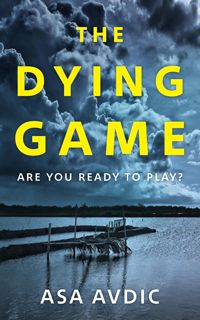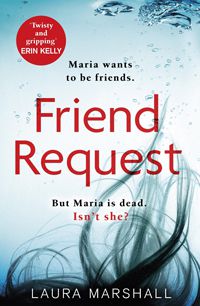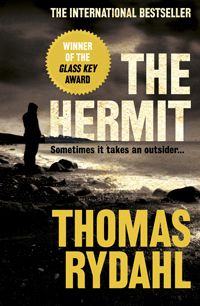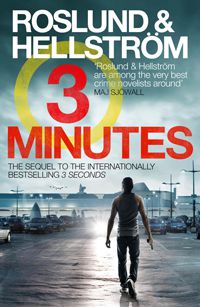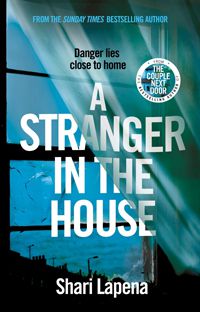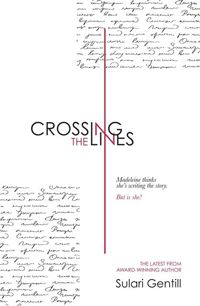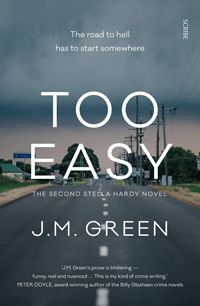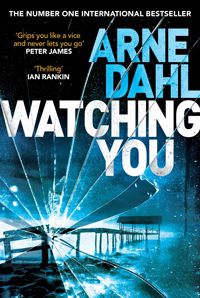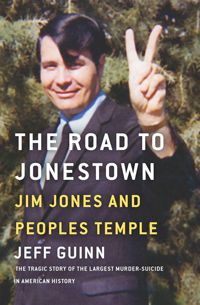CRIME BOOK OF THE MONTH
And Fire Came Down by Emma Viskic
Since Emma Viskic’s debut novel Resurrection Bay took out two of Australia’s biggest crime awards – the Ned Kelly Award for Best First Fiction and a slew of Davitt Awards – readers have been waiting for the sequel. Here it is: a spectacular return to the world of the brittle Caleb Zelic, a private investigator whose office has been moved by financial necessity into his apartment. A man trying very hard to not think about what sent him on this path: a murky trail of betrayal, unfinished business, and the haunting memory of a gun in his hand. Finally, things are no longer getting progressively worse… until, on a run through the streets of Fitzroy, a woman pleads for his help. But before he can give it, they’re accosted, and she bolts in front of a car and is killed. The note left in Caleb’s hand is his address, written down on the back of a train ticket from Resurrection Bay, and there it is again: the draw back home. There, a place of rough surf and community undercurrents that are impossible to fathom, Caleb searches for answers to a question he didn’t have time to understand.
Viskic’s voice is strong and clear. Caleb is a natural smartarse, the kind of protagonist you’d follow into the darkest of places, which is exactly where he’ll always head. His world can be a brutal one, cut through with slivers of hope, but not pulling any punches or holding back on the tasers. Viskic’s characters are diverse, not in a way that ticks boxes, but a natural extension of what Australia really is. Everyone has a history, a story told through speech, whether they mumble or speak clearly or VERY LOUD when they realise – though he’s constantly reticent to disclose it – that Caleb is deaf. And nothing has history like Resurrection Bay itself, a place of snarled and casual racism, of Koori family threads pulling tight in the wake of attack, of Caleb’s struggle to make new connections and hang desperately onto old ones. A darkly beautiful, assured sequel: here’s hoping for more.
NEW CRIME FICTION
The Dying Game by Asa Avdic
This little gem of a book slipped by me so smoothly and well that I didn’t even notice for a long time – even though it was stated clearly at the start – that it’s set in the future. 20 years from now, to be exact. The thrill of this rare futuristic beast cannot be overstated. Anna Francis lives in the Protectorate of Sweden, working for a mysterious unit after returning from a life-altering experience in Central Asian Protectorate Kyzyl Kum, the location of some things best left unknown. Now, she is summoned for a new task: using her skills of intuition, she must go to a house full of job candidates, pretend to be one of them, and then die. After dying, she must hide in the house and watch how they deal with a murder. Only the best can be hired for this job, of course. Unless one of them really ends up murdered …
Friend Request by Laura Marshall
There’s nothing Facebook doesn’t forget, right? It sends you memories of people you no longer see, boyfriends you no longer have, a past you can no longer change. And then sometimes it sends you a friend request from someone who has been dead for 25 years. For Louise, living her serene, middle-class life as an interior designer and single parent, seeing this request throws her back into the memories of her 16-year-old self: painfully trying to fit in, awkwardly hanging onto the vestiges of an old friendship, and seeing (in new girl Maria) a way into normalcy. And now, there’s Maria’s name on her screen, reminding her of what happened all those years ago – what Louise has never been able to forget.
The Hermit by Thomas Rydahl (translated by K.E. Semmel)
We all yearn for fiction to take us to new places: here, Danish author Thomas Rydahl, who won the Danish Crime Glass Key Award for this, takes us to the Canary Islands, where taxi driver Erhard Jorgensen thinks himself a hermit, but can’t resist the pull of the community around him. When he discovers a baby in an abandoned car, he can’t stop thinking about it, and after police come to a suspiciously quick conclusion about what happened and who the mother is, a distrustful Erhard suspects that they’re covering up something much bigger – especially when the woman they blamed is murdered when Erhard was trying to help her. Erhard will do anything, hide anything, and take on anyone to get to the truth in this picturesque slow-burn of a thriller.
3 Minutes by Anders Roslund and Borge Hellström (translated by Elizabeth Clark Wessel)
If anyone has any fears that a book written by two people could be in any way disjointed, read this and feel roundly chastened. The words of journalist Anders Roslund and ex-crim Borge Hellström flow as perfectly as the smoothest of Amazonian currents. In Colombia, Piet Hoffman has run from Sweden and his past as a government agent and an enemy of the Polish mafia. He’s working as security detail for the drug mafioso El Mestizo, living under a new name with his wife and two children, knowing vividly what would happen to all of them if who he was then – and the secret of who he is now – is ever discovered. While his Colombian life is mapped out in bribes and muddy roads, satellites see another pair of eyes watching Hoffman – those of Timothy D. Crouse, speaker of the house, determined to see the end of the drug trade that took his daughter’s life. Crouse’s pursuit of Hoffman sets off a chain of events that sees Hoffman as the one in the crossmarks, with only an old enemy to turn to for help. A beautifully written, visceral tale.
A Stranger in the House by Shari Lapena
Since her debut The Couple Next Door, Shari Lapena has shown that she is a master of the unexpected, able to reel in anyone who says, ‘I’ll just read one more page and go off to bed, shall I?’ (Little do they know.) In A Stranger in the House, Karen is pottering around her kitchen, waiting to for her husband to come home – and wakes up, in the hospital, the intervening time wiped clean. That’s where her memories end. How did she go from the kitchen to a car wrapped around a utility pole? Why is her husband’s alibi not so convincing? Why can’t Karen’s best friend leave it alone? Not to mention the small incident of a murder at the same time – and whether Karen is a lot clearer on what happened than she seems.
Crossing The Lines by Sulari Gentill
Readings favourite Sulari Gentill has released something unexpected this time around – not a new book about the 1930s rascal Rowland Sinclair, but a postmodern tale to claw at your ideas of what a narrative can be. In Crossing The Lines, mystery writer Madeleine is working on a new story, about Edward, who writes literary works – and his newest one is about Madeleine, who is writing about him. When Edward attends a gallery opening and a critic is shoved down the stairs and killed, the question is not only who did it, but who Madeleine decides will do it, and how all of them will deal with the fallout as Madeleine, grieving her own loss, finds that her connection with the fictional Edward is interfering with her relationship with her real-life husband, Hugh. Unless, of course, Edward has been the one in control all along? Gentill’s absolute skill with such a beautifully original and complex tale glows, as her writing always does – and I’m almost 90% sure that she is real, and not a figment of Rowly’s imagination.
Too Easy by J. M. Green
Stella Hardy’s first outing, in J.M. Green’s debut Good Money, was an excellent, gritty, Melburnian story of how a social worker can find themselves on the wrong side of, well, the wrong people. Here, she’s tasked with tracking down drug dealer Isaac Mortimer, who’s vanished just as Stella’s best friend needs him to give evidence and prove that her boyfriend isn’t part of the police corruption he’s been accused of. And even though Stella’s best friend Phuong is a cop herself, there are some things that Stella can do that the force can’t – or won’t, or hadn’t really thought about – like having a cuppa with a dealer instead of arresting them. It’s not long before Stella’s search turns much more dangerous, and she’s on the run from some bad-as-hell bikers and a psycho with a promise tattooed across his knuckles. And while she’s there, she’d better figure out why someone has a plan for the street kids that is anything but supportive.
Watching You by Arne Dahl (translated by Neil Smith)
Detective Sam Berger and his team are looking for 15-year-old Ellen Savinger, kidnapped from in front of her school. A tip-off leads them to a house in the forest; booby-trapped, full of false walls and noxious with the stench of blood, but empty. Apart from a clue, that is, one waiting just for Berger, one to prove what he believes: that Ellen’s disappearance is the work of a serial killer. His superiors don’t want to hear that, however. They won’t entertain the idea of a serial killer in Sweden, and say that there is no such thing. Berger’s worldview and the loss he’s faced have sharpened his focus. In this breathless thriller, readers will follow him through the rain and to the darkest of places to prove a horrific truth.
NEW TRUE CRIME
The Road to Jonestown by Jeff Guinn
November 18, 1978: something so unbelievable happens that it shocks the world. More than 900 people, including some 300 children, die in a murder-suicide in Guyana, South America, after drinking Flavor-Aid (not Kool-Aid, despite the ongoing joke) laced with cyanide. Having written about Charles Manson before, Guinn knows how to dig deep into the type of person who commands this kind of ultimate authority, that makes people abandon their moral code with a long-term plan of utopian communal living, skewed religion and exaggerating the real political fears of the sixties and seventies – not to mention the abuse, the drugs, the blackmail for anyone who wanted to leave. Guinn’s detailed, meticulous research and interviews with the few still alive from the days of Jonestown make for a compelling narrative, avoiding the sensationalism surrounding the chaos that was Jim Jones.


